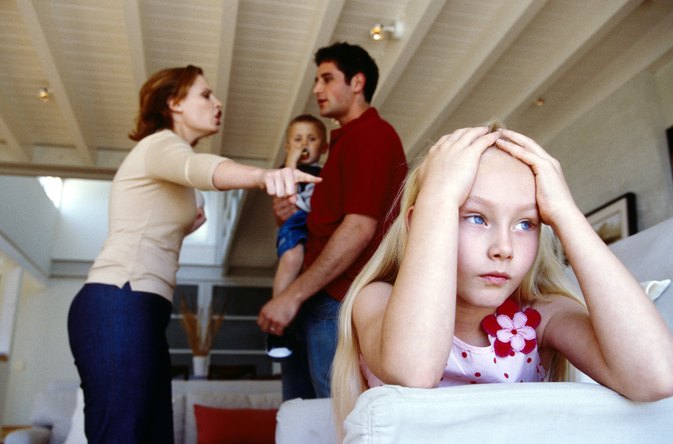Author
by
https://www.livestrong.com/article/514851-social-effect-of-family-stress-on-children/
by
Stress can provoke negative effects in children just as it does with adults. Family stress can be a catalyst for a variety of symptoms in children, according to Novella Ruffin of Virginia State University, including "bed-wetting, upset stomach, irritability, nightmares, lying, withdrawal from activity, change in activity level, poor sleep or eating habits, teeth grinding, or decline in school achievement." Parents and other caregivers who are alert can take proactive steps to alleviate the harmful effects of stress.
VIDEO OF THE DAY
Causes
Stress, according to Ruffin, is "the body's reaction to a physical or emotional situation that causes imbalance in a person's life." Family stresses which can create imbalance and thus have negative effects upon children include a parent's loss of employment, divorce, fights, physical or emotional abuse, death of loved ones, the arrival of new siblings or environmental changes. Working parents must also be mindful that although their children are not exposed to direct and obvious catalysts, lack of parental interaction and feelings of isolation can also produce stress for children.
Symptoms
Parents and other caregivers should be alert to abnormal changes in a child's behavior. They may have cause for concern if a child who is normally friendly and outgoing, for example, becomes isolationist or conversely begins lashing out at peers. Caregivers must investigate if they notice that otherwise unremarkable situations and comments trigger emotional outbursts or disproportional retaliation from a child. Children under stress may also hit, kick, bite or tattle on other kids. Additional symptoms can include crying, bed wetting, stuttering, appetite loss or laziness, according to Ruffin.
Control Conversations
Parents and caregivers must be careful about the information and conversations shared in the presence of children. It's true that it can sometimes be helpful to children to witness "real life" and see their parents or other adults working through tough issues -- if this interaction is healthy and productive. However, parents and caregivers must remember that children also lack the skills, education and life experience to process some "adult level" information or situations.
Action Steps
You can help alleviate or aid your child in coping with stress. First, acknowledge his feelings. Listen to what he has to say and do not minimize or dismiss him. You can also equip your child by helping him formulate descriptions of what he is feeling. Ruffin suggests, "Teach children names or words for their feelings and appropriate ways to express them." Parents and caregivers can also create an affirming environment for kids. This can be done by praising and rewarding positive behaviors rather than simply focusing on coercive punishments to manage negative ones. Another step is to aid kids through the use of stories, drawing, play-acting or "pretend" conversations between toys. A caregiver may ask a child to draw a picture of his home and then ask him why there are dark clouds, or why his parents are not home or how come the characters in the picture are all frowning.
https://www.livestrong.com/article/514851-social-effect-of-family-stress-on-children/






No comments:
Post a Comment